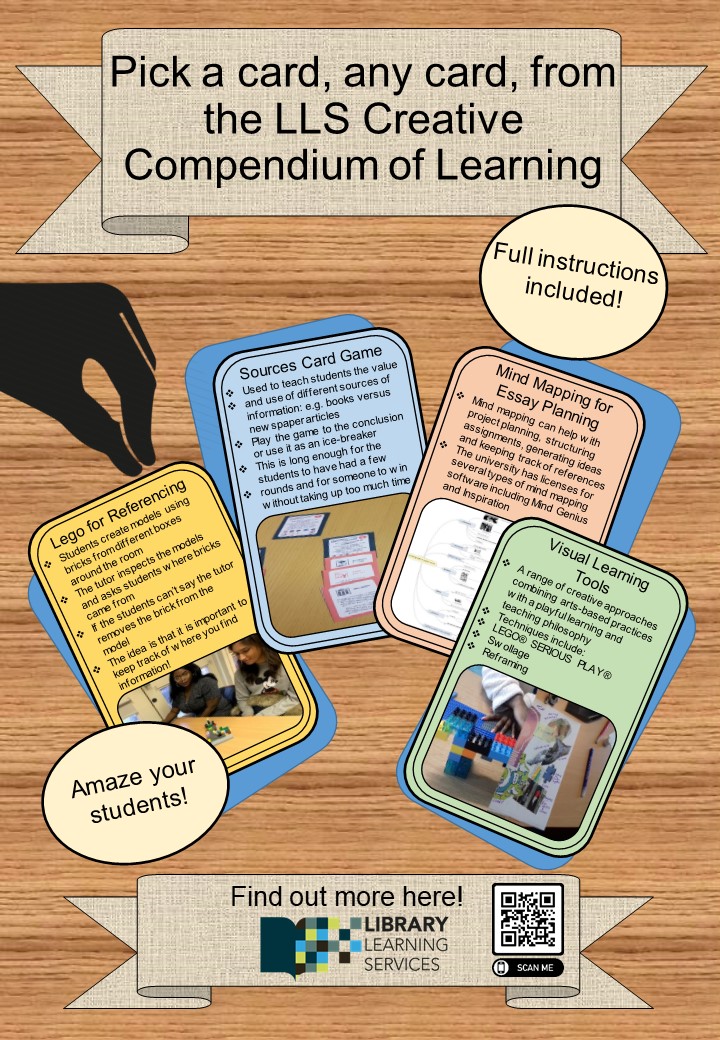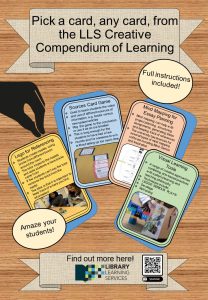
Thanks to Anna Richards, Liaison and Project Librarian, Library & Learning Services, DMU, for this blog post which shares just a few of the imaginative teaching and learning techniques that are available within the DMU Library. Members of the LLS team including Anna, Neil Skinner, Carol Keddie, Kaye and I were involved in developing the approaches outlined below.
Welcome to this blog post showcasing some of the creative approaches to teaching and learning that we’ve been using in the library. All of these approaches use active, constructivist learning techniques that help students arrive at knowledge and understanding themselves rather than relying on didactic delivery. This helps improve student engagement and retention of information.
This blog post outlines the different techniques outlined in our conference poster and provides you with the information you need to use them in your own teaching. If you’d like to know more about any of these techniques or would like to discuss librarians using them in library-led teaching sessions please speak to your liaison librarian:
https://libguides.library.dmu.ac.uk/librarians
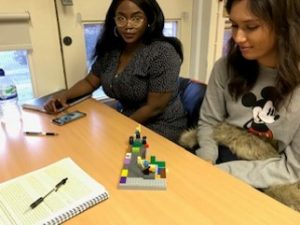
Using Lego to teach referencing
Many students have fond memories of playing with Lego as children so what better medium through which to teach referencing? The exercise works as both an ice-breaker and a way to impart the importance of keeping track of where you get your information from. The basic ‘rules’ are that students have to create a model using bricks from different boxes dotted around the room/tables. After allowing the students some time to create their models the tutor will go to inspect the models and ask some students where they got certain bricks from. If the students can’t say, the tutor removes the brick from the model. The idea is that it is important to keep track of where you find resources/information because you need to be able to direct other people to them and this is why we reference. The tutor can then move on to discuss referencing in more depth.
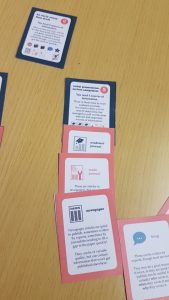
A card game to teach use of academic sources of information
The SOURCES card game was developed by Andrew Walsh of University of Huddersfield. It is designed to teach students the value and use of different sources of information e.g. books are good at providing context and an overview of a topic but not for providing up-to-date information, whereas newspaper articles are good for current information but not for providing in-depth academic coverage of a topic.
You can play the game to the conclusion or use it as an ice-breaker at the start of a session, finishing the game after about 10 minutes. This is long enough for the students to have had a few rounds and for someone to win without taking up too much time. You can download copies of the cards and the rules here:
http://eprints.hud.ac.uk/id/eprint/19346/
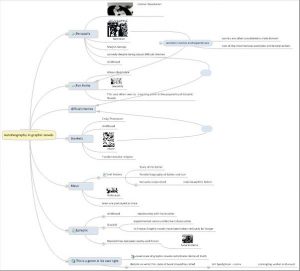
Mindmapping for essay planning
Mind mapping is an easy visual way for students to engage with and express knowledge in different ways. It can help with project planning, structuring assignments, generating ideas, even keeping track of references. The university has licences for several types of mind mapping software including Mind Genius and Inspiration and Library and Learning Services runs workshops forstudents throughout the year (through the LLS Open Programme https://dmu-ac-uk.libcal.com/index.php ).
If you’d like to learn more about using this technique you can book on an Exploring Mind Mapping workshop that is available through the My Development tile on DMUHub (Under Professional and Personal Development).
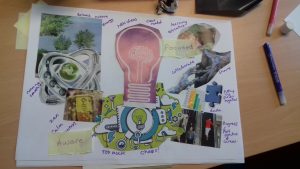
Visual learning tools to enable exploration and creative thinking
Julia Reeve and Kaye Towlson showcase a range of creative learning approaches that combine arts-based practices with a playful, inclusive learning and teaching philosophy, all developed through Writing PAD East Midlands. Some of the techniques include LEGO® SERIOUS PLAY®, Swollage, Reframing and Dress-up Dolls. If you’re interested in knowing more or using some of these techniques please get in contact with either Julia or Kaye.
@dmuwritingpad.
https://writingpad.our.dmu.ac.uk/sample-page/
Library and Learning Services offers a wide range of support for faculty and students, including:
• In curriculum sessions
• Open programme of bookable workshops
• E-learning for specific modules
• Subject and support guides on library web
pages
• Assignment drop-ins and Librarian 1:1s
To arrange sessions speak to your Academic
Liaison Librarian
http://libguides.library.dmu.ac.uk/librarians
You can view our LLS Creative Compendium of Learning Poster in real life at the DMU Learning & Teaching Conference, 11th September 2019 https://www.dmu.ac.uk/about-dmu/professional-services/academic-professional-development/conferences-and-events/conferences-and-events.aspx
Back soon,
Julia
